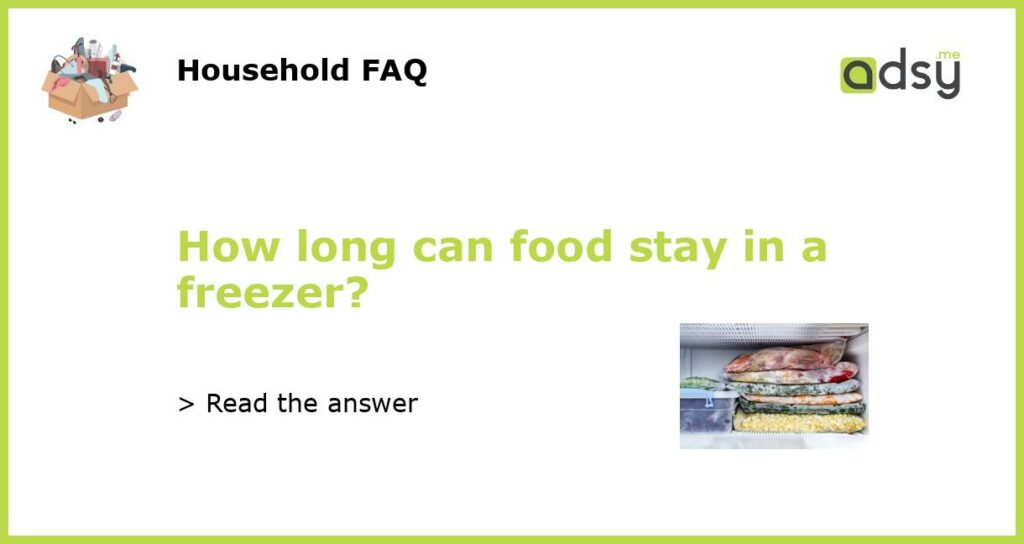How Long Can Food Stay in a Freezer?
Freezing is a popular method of food preservation that allows you to extend the shelf life of various items. But how long can food really stay in a freezer before it goes bad? The answer depends on several factors, including the type of food, the packaging, and how the freezer is maintained. Let’s explore these factors in detail to understand the longevity of frozen food.
The Type of Food Makes a Difference
Not all foods can be frozen for the same duration. Some items, like fresh fruits and vegetables, can lose their texture and flavor when frozen for too long. On the other hand, staples like meat and poultry can last longer in the freezer. Here are a few guidelines for different food types:
- Meat and Poultry: Raw meat and poultry can remain safe to eat for several months in the freezer. Ground meats like beef or chicken will last between three to four months, while whole cuts of meat can last up to 12 months.
- Seafood: Fish and shellfish can be stored in the freezer for three to six months, depending on the type. Fatty fish like salmon tend to have a shorter freezer life compared to leaner fish like cod.
- Fruits: Most fruits can be frozen for up to six months without significant loss of quality. However, berries and softer fruits tend to have a shorter freezer life.
- Vegetables: Like fruits, most vegetables can be frozen for up to six months. However, blanching them before freezing can help retain their texture and taste.
- Dairy and Eggs: Dairy products like cheese and butter can be frozen for several months but may undergo some texture changes. Eggs can also be frozen, but it’s best to remove them from their shells before freezing.
Packaging and Storage Matters
Proper packaging is crucial to maintaining the quality of frozen food. When storing food in the freezer, make sure to use airtight containers or freezer bags to prevent freezer burn. Freezer burn occurs when the food is exposed to air, causing dehydration and altering the taste and texture.
It’s also important to label the containers with the date of freezing. This way, you can easily track how long the food has been stored and prioritize using older items first. If you’re using freezer bags, try to remove as much air as possible before sealing them. Vacuum-sealed bags are an excellent option for long-term storage as they remove all the air and help maintain the quality of the food.
Maintaining the Freezer Temperature
The temperature of your freezer plays a significant role in determining the longevity of frozen food. The Food and Drug Administration (FDA) recommends keeping the freezer at or below 0°F (-18°C) for optimal storage. At this temperature, the growth of bacteria and other pathogens is significantly slowed down.
If your freezer has an adjustable thermostat, make sure it’s set at the correct temperature. It’s also important to avoid frequent temperature fluctuations by not leaving the freezer door open for extended periods. Opening the freezer frequently can cause temperature fluctuations, which can affect the quality of the food stored inside.
Exceptions and Freezer Burn
While the guidelines mentioned above provide a general idea of how long food can stay in the freezer, there are a few exceptions. Some packaged foods may come with a “best by” or “use by” date that should be followed for optimal quality. These dates are different from the expiration dates and are typically related to the quality rather than the safety of the food.
Additionally, even with proper packaging and storage, freezer burn can still occur over time. It may cause an unappealing taste and texture, but it doesn’t necessarily mean the food is unsafe to eat. If you notice any signs of freezer burn, such as dry spots or ice crystals on the food’s surface, it’s best to use them as soon as possible to maintain the quality.
The longevity of food in the freezer depends on various factors, including the type of food, packaging, and freezer temperature. While most frozen foods can be stored for several months, it’s important to follow specific guidelines for different food types. Proper packaging and storage help prevent freezer burn and maintain the quality of frozen food. By understanding these factors and following best practices, you can maximize the shelf life of your frozen items and reduce food waste.






